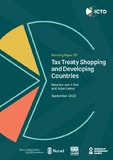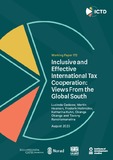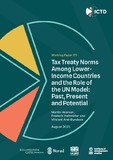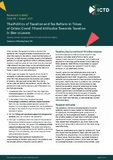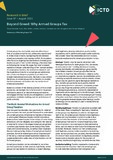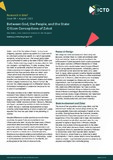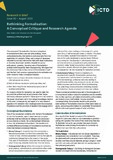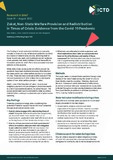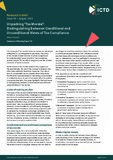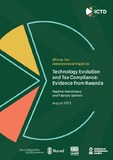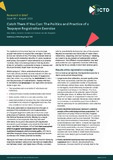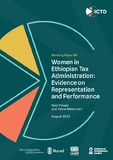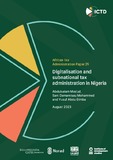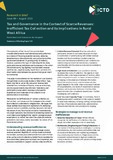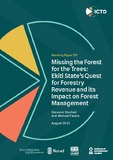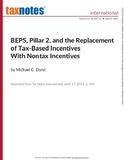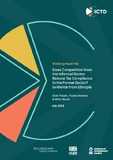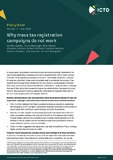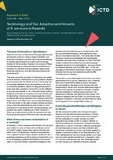International Centre for Tax and Development: Recent submissions
Now showing items 61-80 of 490
-
Tax Treaty Shopping and Developing Countries
(Institute of Development Studies, 2023-09)Analysis of the international network of double tax treaties reveals a large potential for tax avoidance. Developing countries are, on average, not more likely to suffer from tax revenue losses than other countries. Yet, ... -
Inclusive and Effective International Tax Cooperation: Views From the Global South
(Institute of Development Studies, 2023-08-30)In 2023, demands for the United Nations to take up a larger role in global tax governance are louder than ever before. Nevertheless, there is not yet a global consensus on the way forward. In this paper we investigate how ... -
Tax Treaty Norms Among Lower- Income Countries and the Role of the UN Model: Past, Present and Potential
(Institute of Development Studies, 2023-08-30)Bilateral tax treaties draw heavily from model conventions published by international organisations. In this paper we investigate the influence of the UN model on tax treaties signed by lower-income countries, as well as ... -
The Politics of Taxation and Tax Reform in Times of Crisis: Covid-19 and Attitudes Towards Taxation in Sierra Leone
(Institute of Development Studies, 2023-08-23)A key question facing governments is whether the pandemic has changed attitudes towards taxation and what this means for tax reform. Given that the history of tax policy in high-income countries reveals a link between ... -
Beyond Greed: Why Armed Groups Tax
(2023-08)Armed groups tax. Journalistic accounts often have a tone of surprise about this fact, while policy reports tend to strike a tone of alarm, highlighting the link between armed group taxation and ongoing conflict. ... -
Explaining Informal Taxation and Revenue Generation: Evidence from south-central Somalia
(Institute of Development Studies, 2023-08)Most people in low-income countries contribute substantially to the financing of local public goods through informally generated revenue – that is, non-market payments that are not required or defined by state law ... -
Between God, the People, and the State: Citizen Conceptions of Zakat
(Institute of Development Studies, 2023-08-23)Zakat – one of the five pillars of Islam – is an annual obligatory payment, typically equivalent to 2.5 per cent of an individual’s productive wealth, to a set of appropriate recipients, including the poor. The annual ... -
Rethinking Formalisation: A Conceptual Critique and Research Agenda
(Institute of Development Studies, 2023-08-01)The concept of ‘formalisation’ has been ubiquitous in development discourse and policymaking. It has underpinned policy interventions and proposals from tax registration to property titling, and a range of measures ... -
Zakat, Non-State Welfare Provision and Redistribution in Times of Crisis: Evidence from the Covid-19 Pandemic
(Institute of Development Studies, 2023-08-01)The funding of social protection initiatives is especially complex in times of crisis. While social protection is critical as a means of redistributing income, delivering relief to those in particular need, and building ... -
Unpacking ‘Tax Morale’: Distinguishing Between Conditional and Unconditional Views of Tax Compliance
(Institute of Development Studies, 2023-08-17)The concept of ‘tax morale’ seeks to capture an individual’s willingness (or unwillingness) to pay taxes. The study of tax morale in lower-income countries is significant for understanding “quasi-voluntary” tax compliance, ... -
Technology Evolution and Tax Compliance: Evidence from Rwanda
(Institute of Development Studies, 2023-08)Information technology (IT) has great potential to help increase taxpayer compliance and revenue collection. Despite the increasing use of IT solutions by African tax administrations, evidence on its effectiveness ... -
Catch Them If You Can: The Politics and Practice of a Taxpayer Registration Exercise
(Institute of Development Studies, 2023-08)Tax registration drives have become an increasingly popular intervention to expand the coverage of tax nets across sub-Saharan Africa. Promising increased revenue for states and formalisation benefits for newly ... -
Women in Ethiopian Tax Administration: Evidence on Representation and Performance
(Institute of Development Studies, 2023-08)In the growing body of research on gender and taxation in low-income countries, the implications of having more women in tax administration have received relatively little attention. Using data from employee records and ... -
Digitalisation and Subnational Tax Administration in Nigeria
(Institute of Development Studies, 2023-08)Recently, there has been an expansion in the deployment of digital systems and digital IDs among taxing authorities. However, little is known about the extent to which such technologies are being adopted, or about whether ... -
Tax and Governance in the Context of Scarce Revenues: Inefficient Tax Collection and its Implications in Rural West Africa
(Institute of Development Studies, 2023-08-09)The expansion of the ‘tax net’ has commanded considerable domestic and international policy attention as a means of financing essential services, reducing dependence on international aid, and producing positive ‘government ... -
Missing the Forest for the Trees: Ekiti State’s Quest for Forestry Revenue and its Impact on Forest Management
(Institute of Development Studies, 2023-08)Forests are important socio-economic assets in many low-income countries. However, they are often over-exploited as governments do not sufficiently valorise them, including by taxing them inefficiently. This is the case ... -
BEPS, Pillar 2, and the Replacement of Tax-Based Incentives With Nontax Incentives
(Tax Analysts, 2023-04-17)The 15 percent minimum tax will reduce the appeal of both the implicit investment incentives made available by BEPS planning and the explicit tax-based incentives that countries provide through measures like tax ... -
Does Competition from the Informal Sector Reduce Tax Compliance in the Formal Sector? Evidence from Ethiopia
(Institute of Development Studies, 2023-07-20)It is widely believed that the existence of ‘informal sector’ enterprises that visibly do not pay direct taxes reduces the willingness of owners of formal, tax-registered enterprises to pay their own taxes. We call this ... -
Why Mass Tax Registration Campaigns Do Not Work
(Institute of Development Studies, 2023-07)In recent years, policymakers and donors have become increasingly interested in the use of mass registration campaigns as a tool to expand the tax nets of lower-income countries. While registering taxpayers is common – and ... -
Technology and Tax: Adoption and Impacts of E-services in Rwanda
(2023-05)Many low-income countries are increasingly digitising their tax services, which can bring a range of benefits, from reducing compliance costs and improving record-keeping, to limiting opportunities for corruption and ...

